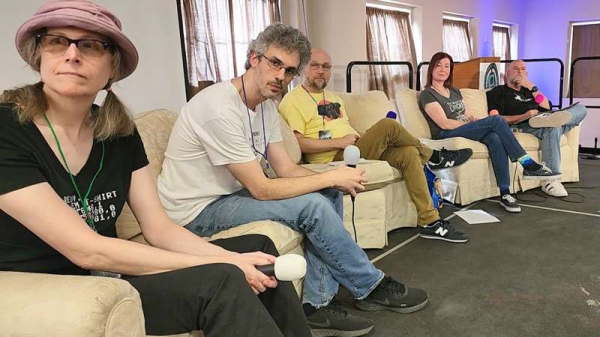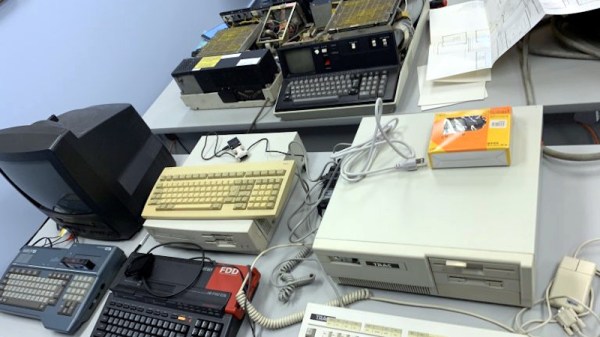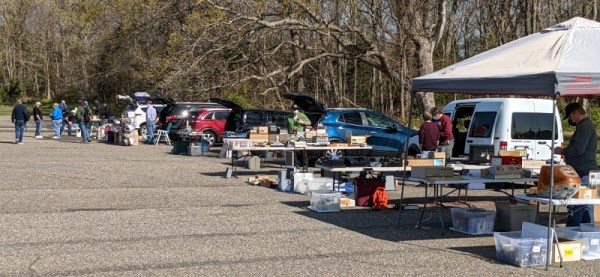Cloudy with a chance of concrete? The “success” of last week’s brief but eventful Starship launch has apparently raised some regulatory eyebrows, with the Federal Aviation Administration launching an investigation into the destruction wrought by the mighty rocket. And it’s not just the hapless Dodge Caravan that they’re concerned with — although we found some fantastic POV footage that shows the kill shot as well as close-ups of the results — but also the damage rained down upon residents around the Boca Chica launch complex. Tons of concrete and rebar were excavated by the 33 Raptor engines during the launch and sent in all directions, reportedly landing up to 6 miles (10 kilometers) from the pad. What’s worse, a lot of debris ended up on beaches that are home to endangered species, which has the Sierra Club also taking an interest. The FAA has apparently nixed any launches from the Texas facility until they complete their investigation.
VCF64 Articles
VCF East 2023: Retro Luminaries Take The Stage
Our friend [Fran Blanche] recently recorded what it was like to participate in an energetic round table at the recently held Vintage Computer Festival (VCF) East. Fran joined well known personalities [Jeri Ellsworth], [Adrian Black] of Adrian’s Digital Basement, and Usagi Electric creator [Dave Lovett] with yours truly moderating.
The table-less roundtable discussed the pros and cons of streaming about retro and tech, and what its like to hang yourself out there in video format. Goals and motives differed widely from speaker to speaker and there was some good-natured ribbing about who makes money vs. who simply gets away with spending less.
Most of all fun was had by the speakers as they interacted with each other, and with the audience — and that comfort came across to the standing room only crowd of avid retro-enthusiasts who only told us good things about what they saw and heard that night.
One thing we did note was that every speaker actually knew what microphones were and how to use them.
Want to learn more about the 2023 Vintage Computer Festival East? You can start by checking out our previous coverage, and don’t miss the first in a series of fascinating interviews recorded by the Hackaday crew as they explored this phenomenal retrocomputing event.
Continue reading “VCF East 2023: Retro Luminaries Take The Stage”
Vintage Computer Festival East Is This Weekend
This weekend the InfoAge Science and History Museum in Wall, New Jersey will once again play host to the Vintage Computer Festival East — the annual can’t-miss event for anyone who has even a passing interest in the weird and wonderful machines that paved the way for the supercomputers we now all carry around in our pockets. Ticket holders will have access to a program absolutely jam packed with workshops, talks, and exhibits that center around the dual themes of “Women in Computing” and “Computers for the Masses”, plus a consignment and vendor area that almost guarantees you’ll be going home a little poorer than when you got there. But hey, at least you’ll have some new toys to play with.
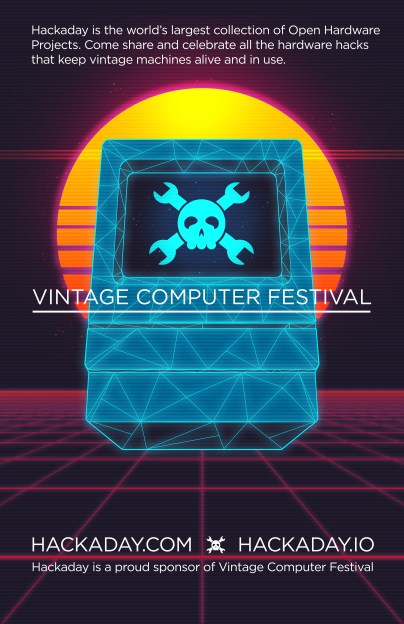 For those that can’t make the pilgrimage to the tropical wonderland that is the Jersey Shore in April, all three days of the Festival will be live-streamed to the VCF YouTube page. There’s even an official Discord server where you can chat with other remote attendees. We’re glad to see more events adopting a hybrid approach after two years of COVID-19 lockdown, as it gives the far-flung a chance to participate in something they would otherwise miss completely. That said, there’s no virtual replacement for the experience of browsing the exhibits and consignment areas, so if it’s at all possible we recommend you get yourself to InfoAge for at least one of the days.
For those that can’t make the pilgrimage to the tropical wonderland that is the Jersey Shore in April, all three days of the Festival will be live-streamed to the VCF YouTube page. There’s even an official Discord server where you can chat with other remote attendees. We’re glad to see more events adopting a hybrid approach after two years of COVID-19 lockdown, as it gives the far-flung a chance to participate in something they would otherwise miss completely. That said, there’s no virtual replacement for the experience of browsing the exhibits and consignment areas, so if it’s at all possible we recommend you get yourself to InfoAge for at least one of the days.
Incidentally, don’t worry if you’ve got the sneaking feeling that it hasn’t been anywhere near a year since the last time the VCF descended on Wall Township. The 2021 Festival got pushed to October because of the lingering plague, but rather than permanently change the date going forward, the 2022 Festival has returned to its traditional season. Of course that means the wait until VCF 2023 will seem unusually long after this double-shot, so here’s hoping we see another swap meet at the InfoAge campus before the end of the year.
Don’t Miss The VCF Indoor Swap Meet This Weekend
We don’t need to tell you that these last couple of years have been a real drag for in-person events. But at long last, after a bit of a false start last summer, it seems like we can finally start peeking our heads out and getting back to doing the things we love. So why not celebrate by taking part in that most sacred of geek pastimes: poring through boxes of dusty old gear in search of some electronic treasure?
 On Saturday the Vintage Computer Federation (VCF) is holding an indoor swap meet at the InfoAge Science and History Museum in New Jersey, and everyone’s invited. Vintage computers will naturally be the main attraction, but if their previous events are any indication, you should expect the tables to be filled with a healthy mix of general electronics, classic games, and amateur radio gear as well. The doors open up at 8 AM sharp and it’s free to get in, so we’d suggest showing up early for the best selection.
On Saturday the Vintage Computer Federation (VCF) is holding an indoor swap meet at the InfoAge Science and History Museum in New Jersey, and everyone’s invited. Vintage computers will naturally be the main attraction, but if their previous events are any indication, you should expect the tables to be filled with a healthy mix of general electronics, classic games, and amateur radio gear as well. The doors open up at 8 AM sharp and it’s free to get in, so we’d suggest showing up early for the best selection.
A little less than a year ago we visited the previous VCF swap meet, which back then had to be held outdoors due to COVID-19 concerns, and were blown away by the selection of weird and wonderful hardware up for grabs. From arcade cabinets to luggable PCs and 3D printers, there was a little something for everyone, and all at rock-bottom prices. The only real gripe we had was the lack of on-site food and beverage, which according to the VCF website, has been addressed this time around. No word on whether or not there’s an ATM handy though, so you might want to stop and get some cash before heading to the relatively remote Camp Evans site.
After the swap meet wraps up at 2 PM, be sure to check out the Vintage Computer Federation’s permanent collection at InfoAge, as well as all the incredible exhibits and mini-museums the site has to offer. If nothing else, we strongly recommend you take the walk down the road to the TLM-18 Space Telemetry Antenna that Princeton University currently operates as Linux-powered software defined radio telescope.
The fine folks of the VCF are also hard at work putting together their annual East Coast Vintage Computer Festival, which will take place at InfoAge on April 22nd to the 24th, so mark your calendars.
Vintage Computer Festival East Reboots This Weekend
We don’t have to tell the average Hackaday reader that the last two years have represented a serious dry spell for the type of in-person events that our community has always taken for granted. Sure virtual hacker cons have their advantages, but there’s nothing quite like meeting up face to face to talk shop with like-minded folks and checking out everyone’s latest passion project.
Luckily for classic computer aficionados, especially those on the East Coast of the United States, the long wait is about to end. After being forced to go virtual last year, Vintage Computer Festival East will once again be opening their doors to the public from October 8th to the 10th at the InfoAge Science & History Center in Wall, New Jersey. Attendees will need to wear a mask to gain access to the former Camp Evans Signal Corps R&D laboratory, but that’s a small price to pay considering the impressive list of exhibits, presentations, and classes being offered.
In fact, it’s shaping up to be the biggest and best VCF East yet. The Friday classes cover a wide range of topics from CRT repair to implementing a basic video controller with a FPGA, and the list of speakers include early computer luminaries such as Michael Tomczyk, the Product Manager for the VIC-20, and Adventure International founder Scott Adams. A little birdie even tells us that if you bring your copy of Back into the Storm, our very own Bil Herd will be sign it for you after his talk on the history of the Commodore wraps up Saturday evening.
 If you’d rather get hands-on you can always take a walk over to the Computer Deconstruction Laboratory, InfoAge’s on-site hackerspace. Glitch Works will be on hand with several popular kits such as the XT-IDE, an 8-bit ISA adapter that lets you connect (relatively) modern drives to classic machines, and the R6501Q/R6511Q Single Board Computer. A bit rusty with the iron and would rather start on something a little easier? Not to worry. Neil Cherry, a staple of the Hackaday comment section since before we switched to color pictures, will be instructing hackers young and old in the ways of the flux during his all-day soldering classes.
If you’d rather get hands-on you can always take a walk over to the Computer Deconstruction Laboratory, InfoAge’s on-site hackerspace. Glitch Works will be on hand with several popular kits such as the XT-IDE, an 8-bit ISA adapter that lets you connect (relatively) modern drives to classic machines, and the R6501Q/R6511Q Single Board Computer. A bit rusty with the iron and would rather start on something a little easier? Not to worry. Neil Cherry, a staple of the Hackaday comment section since before we switched to color pictures, will be instructing hackers young and old in the ways of the flux during his all-day soldering classes.
Of course, no VCF trip is truly complete until you’ve searched for treasure in the consignment room. The space has been expanded for 2021, and considering how long folks have had to clean out their attics and garages thanks to the pandemic, we’re expecting a bumper crop of interesting hardware to wade through. If the turnout for the VCF Swap Meet in April was any indication, we’d suggest bringing some extra cash with you.
As a proud sponsor of the 2021 Vintage Computer Festival East, Hackaday will naturally be bringing you a first-hand account of the overall event as well as a deeper look into some of the incredible exhibits on display in the very near future. But words and pictures on a page can only go so far. If you’ve grown tired of virtual events and are looking to peek your head out, we can guarantee a trip to InfoAge this weekend will be well worth the gas money for anyone within driving distance.
VCF Swap Meet Takes Step Back To Move Forward
When computers were the sort of thing you ordered from a catalog and soldered together in your garage, swap meets were an invaluable way of exchanging not just hardware and software, but information. As computers became more mainstream and readily available, the social aspect of these events started to take center stage. Once online retail started really picking up steam, it was clear the age of the so-called “computer show” was coming to a close. Why wait months to sell your old hardware at the next swap when you could put it on eBay from the comfort of your own home?
Of course, like-minded computer users never stopped getting together to exchange ideas. They just called these meets something different. By the 2000s, the vestigial remnants of old school computer swap meets could be found in the vendor rooms of hacker cons. The Vintage Computer Festival (VCF) maintained a small consignment area where attendees could unload their surplus gear, but it wasn’t the real draw of the event. Attendees came for the workshops, the talks, and the chance to hang out with people who were passionate about the same things they were.
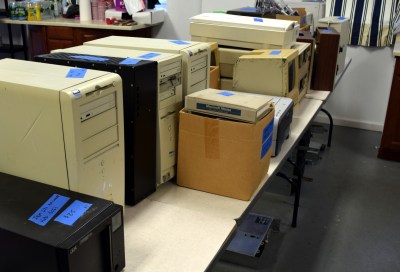
Then came COVID-19. For more than a year we’ve been forced to cancel major events, suspend local meetups, and in general, avoid one another. Some of the conventions were revamped and presented virtually, and a few of them actually ended up providing a unique and enjoyable experience, but it still wasn’t the same. If you could really capture the heart and soul of these events with a video stream and a chat room, we would’ve done it already.
But this past weekend, the folks behind VCF East tried something a little different. As indoor gatherings are still strongly discouraged by New Jersey’s stringent COVID restrictions, they decided to hold a computer swap meet in the large parking lot adjacent to the InfoAge Science and History Museum. There were no formal talks or presentations, but you could at least get within speaking distance of like-minded folks again in an environment were everyone felt comfortable.
Continue reading “VCF Swap Meet Takes Step Back To Move Forward”
Remoticon Video: Intro To Modern Synthesis Using VCV Rack
Modular synthesizers, with their profusion of knobs and switches and their seemingly insatiable appetite for patch cables, are wonderful examples of over-complexity — the best kind of complexity, in our view. Play with a synthesizer long enough and you start thinking that any kind of sound is possible, limited only by your imagination in hooking up the various oscillators, filters, and envelope generators. And the aforementioned patch cables, of course, which are always in short supply.
Luckily, though, patch cables and the modules they connect can be virtualized, and in his 2020 Remoticon workshop, Jonathan Foote showed us all the ways VCV Rack can emulate modular synthesizers right on your computer’s desktop. The workshop focused on VCV Rack, where Eurorack-style synthesizer modules are graphically presented in a configurable rack and patched together just like physical synth modules would be.
Continue reading “Remoticon Video: Intro To Modern Synthesis Using VCV Rack”


